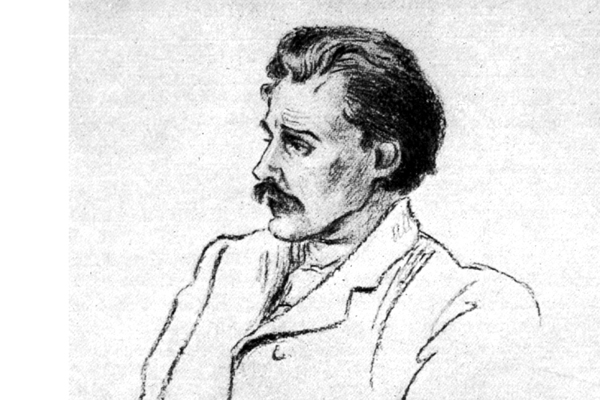Sitting down to inspect the final volume of Pierre Coustillas’s monumental trilogy, I decided to start by counting the number of titles by or about George Gissing (1857–1903) that gleamed from the bookshelf hard by. There were 45 of them. Next, I decided to count the number of these items with which Professor Coustillas was in some way associated, either as editor, compiler or presiding genius. This realised a tally of 19, including such titanic endeavours as the Collected Letters of George Gissing (nine vols, 1990–1997) or the 600-page and now, alas, superannuated George Gissing: The Definitive Bibliography from 2005.
As these statistics confirm, Coustillas is the staunchest defender, proselytiser and all-round apologist that Gissing ever had: a long-term conductor of the Gissing Journal, an impresario of every Gissing project worth the name, fit to be ranked, in the reputation-broking stakes, with Ernest Mehew on Stevenson and Gordon N. Ray on Thackeray.
Maintained for upwards of four decades now, this pivotal role in Gissing Studies has not been entirely benign: certainly Paul Delaney, who made the fatal mistake of striking out on a line of his own with George Gissing: A Life in 2008, was subjected to a ten-page review of such startling venom that you wonder he ever dared raise his head above the academic parapet again.
The third part of Coustillas’s epic finds our man in his 40th year, his street-walking first wife dead in conditions of unimaginable squalor, her shrewish replacement beyond living with, but sexual redemption lying on the horizon in the shape of Gabrielle Fleury, Gissing’s French translator and the only woman with whom he seems ever to have established a satisfactory relationship.
There were still substantial works waiting to be written, notably The Crown of Life (1899) and The Private Papers of Henry Ryecroft (1903), but Gissing’s health was breaking up and the last years of his life were a round of sanatorium visits, the hunt for a temperate climate — he ended up living in St-Jean-Pied-de-Port on the French Atlantic coast — and faint mistrust of the domestic routines enforced by Mlle Fleury and her exigent mamma.
This volume is, consequently, a study in diminuendo, the glory all gone, the shadows looming, the fatalism and quietism that are such an enduring part of Gissing’s mental outlook conspicuously to the fore. But as he wanders around southern Italy on the journey that produced his travel book By the Ionian Sea (1901), or mingles with expats in continental boarding houses, the reader will be conscious of a subsidiary force at work. This, curiously enough, is the bracing sense of being present at the judgment seat.
The judge, inevitably, is Professor Coustillas. The defendants are a heterogeneous crowd: magazine editors, critics, low-brows, religious believers — anyone, in fact, who Coustillas suspects of having sold his hero short, professionally, intellectually or socially. Thus, of the reviewers of Human Odds and Ends (1898):
The more crassly unintelligent of them are at least significant indexes of the poor intellectual qualifications and benighted turn of mind of some critics whose notion of literature was both simplistic and arch-conventional.
The English people Gissing meets in Rome are damned for leading ‘a futile life in the so-called Eternal City’, and even a jury summons is couched in the ‘turgid, cliché-ridden language of which, decades before, Dickens had made fun’.
Much of this is very funny, if only for its arbitrariness. Like all good antagonists, Coustillas doesn’t care where he gets his ammunition: the important thing is that the bullet strikes home. And so when Sir William Robertson Nicoll, a gossiping Free Church minister from Aberdeen who edited the British Weekly, is written off as ‘that honours-hunting, Nonconformist chatterbox’, you infer that poor Sir William would be getting exactly the same treatment were he a silent, honours-shunning atheist. Interestingly, one of Coustillas’s prime villains turns out to be H.G. Wells, who, arriving at Gissing’s sickbed on Christmas Day 1903, commandeered the nursing arrangements, and by force-feeding the patient pints of champagne, beef tea and coffee, more or less killed him on the spot.
As for Gissing himself, from whichever angle you inspect his short and melancholy existence, this was a tragic life: not merely the rather familiar parable of the machine-age intellectual who refuses to lower his standards in order to earn a decent living and declines to write for the mob, but the story of a man so temperamentally unfitted to the patterns of conventional late-Victorian life that most of his engagements with it were simple torture.
In devoting the best part of 40 years to its patient unravelling, Coustillas is as much my hero as Gissing is his.






Comments